M2Unit 2 Welcome to the unit
新牛津译林版高中英语Module 2 Unit 2 Welcome to the unit 课件
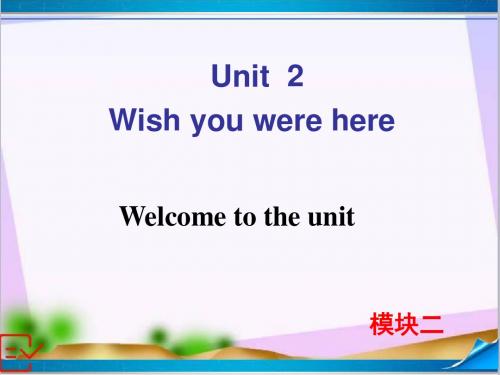
What items should we take when traveling?
12 13
2
3
1. backpack
2. towel
3. compass
er purifying
tablets
1
9
5. book
8
7
6 6. first aid kit
12
13
2
11 10
The African elephant
The African elephant is the largest land mammal on Earth. They usually live in groups that consist of 8 to 15 related members.
Australia
What should we do before traveling?
• decide where to go and make a travel plan; • work out the traveling expenses; • learn something about your destination.
3. Why do more and more people like to travel, even some of them traveling abroad?
People travel for different purposes:
• to enjoy the beauty of nature • to learn about the outside world • to get excitement or relax oneself • to do some research • to study wildlife or plants • to be interested in local food • to do business or make friends…
unit 2 Welcome to the unit
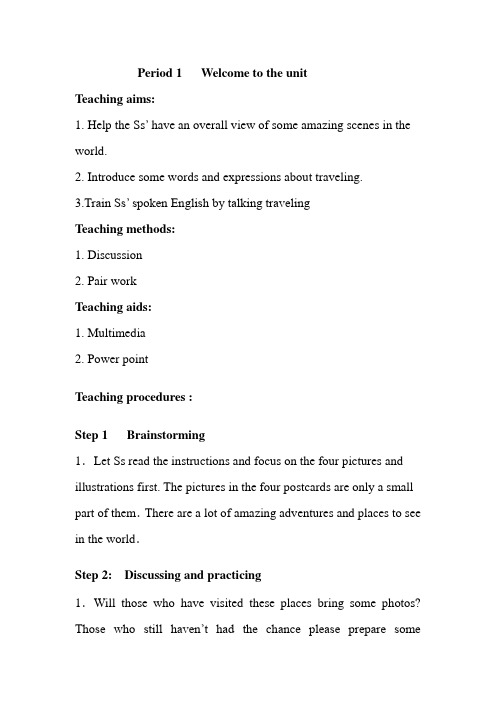
Period 1 Welcome to the unitTeaching aims:1. Help the Ss’ have an overall view of some amazing scenes in the world.2. Introduce some words and expressions about traveling.3.Train Ss’ spoken English by talking travelingTeaching methods:1. Discussion2. Pair workTeaching aids:1. Multimedia2. Power pointTeaching procedures :Step 1 Brainstorming1.Let Ss read the instructions and focus on the four pictures and illustrations first. The pictures in the four postcards are only a small part of them.There are a lot of amazing adventures and places to see in the world.Step 2: Discussing and practicing1.Will those who have visited these places bring some photos? Tho se who still haven’t had the chance please prepare somepostcards.Let’s discuss the photos based on the following questions.1).When and with whom did you go to…?2).Did you enjoy yourselves there?3). What impressed you most about that place?4).Do you think it is worth a visit?Step 3 Introducing background informationI’d like to offer some background information for you to reference.(1). Grasslands of AfricaThe grasslands of Africa are home to various animals. Lions are the only cats that live in large family groups. Elephants usually live in groups that consist of 8 to 15 related members. Zebras, with a horse-like appearance, have wide black-and-white stripes all over their bodies. Giraffes in Africa can grow to a height of over 17 feet. If you'd like more information about these animals, you can visit the following websites:(2). Gold CoastAustralia's Gold Coast is famous for its attractive beaches. With 70 kilometres of coastline, Gold Coast beaches have somethingfor everyone. Every year the Gold Coast attracts visitors from all over world to sit back, relax, experience the fun and taste the excitement of Australia's most popular holiday playground. For moreinformation, you can visit the following website:(3). Rainforest in BrazilThe Amazon rainforest extends for 4 million sq km and is home to hundreds of thousands of animals and plant species. Although it covers only 3.5% of the overall Earth's surface, it is home to around 50% of the world's living species, many of which are still unknown to humans. The following website will give you more information:(4). Gobi DesertWhere is the Gobi Desert? What is it like? Is this a place you’d like to visit? Tell me your reasons.Have you ever heard of a person who traveled across the Gobi Desert all by himself/herself ? Can you think of the difficulties he /she might have met with during his/her journey ?2.Talk about the three questions listed under the four pictures in groups for a couple of minutes.Please focus on the three questions individually and think of proper answers to the questions.Make the best of the chance to express your opinion and listen to your group members’ opinions.I’d like to invite some students to reportyour opinions to the class.Homework1.Read and recite the new words.2.Workbook Ex. P.92 ABC。
2020-2021学年牛津译林版英语八年级下册Unit2Welcometotheunit教案
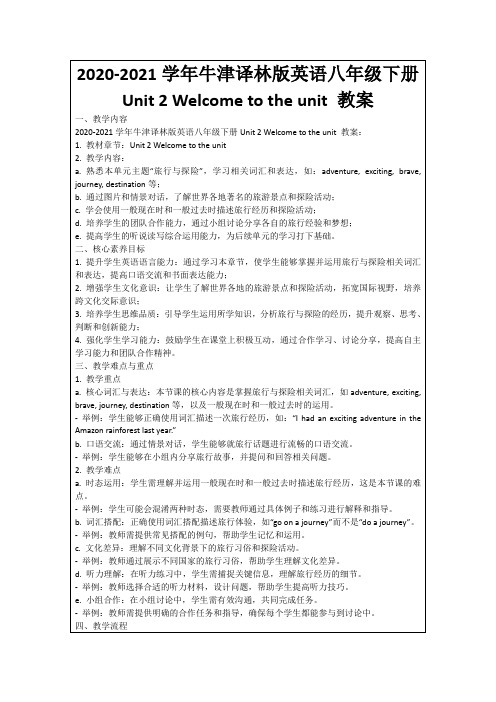
-举例:学生能够在小组内分享旅行故事,并提问和回答相关问题。
2.教学难点
a.时态运用:学生需理解并运用一般现在时和一般过去时描述旅行经历,这是本节课的难点。
-举例:学生可能会混淆两种时态,需要教师通过具体例子和练习进行解释和指导。
b.词汇搭配:正确使用词汇搭配描述旅行体验,如“go on a journey”而不是“do a journey”。
-举例:教师需提供常见搭配的例句,帮助学生记忆和运用。
c.文化差异:理解不同文化背景下的旅行习俗和探险活动。
-举例:教师通过展示不同国家的旅行习俗,帮助学生理解文化差异。
d.听力理解:在听力练习中,学生需捕捉关键信息,理解旅行经历的细节。
-举例:教师选择合适的听力材料,设计问题,帮助学生提高听力技巧。
3.重点难点解析:在讲授过程中,我会特别强调一般现在时和一般过去时的运用,以及旅行与探险相关词汇的使用。对于难点部分,我会通过举例和练习来帮助大家理解。
(三)实践活动(用时10分钟)
1.分组讨论:学生们将分成若干小组,每组讨论一个与旅行相关的实际问题,如旅行计划、目的地选择等。
2.实验操作:为了加深对时态的理解,我们将进行一个简单的对话练习。这个练习将演示如何使用一般现在时和一般过去时描述旅行经历。
此外,我还注意到,部分学生在总结回顾环节,对于今天学习的知识点仍然存在疑问。为了帮助这部分学生更好地掌握知识,我打算在课后提供一些额外的辅导和练习,确保他们能够跟上课程进度。
2020-2021学年牛津译林版英语八年级下册Unit 2 Welcome to the unit教案
一、教学内容
2020-2021学年牛津译林版英语八年级下册Unit 2 Welcome to the unit教案:
牛津高一英语M2U2Welcometotheunit教案
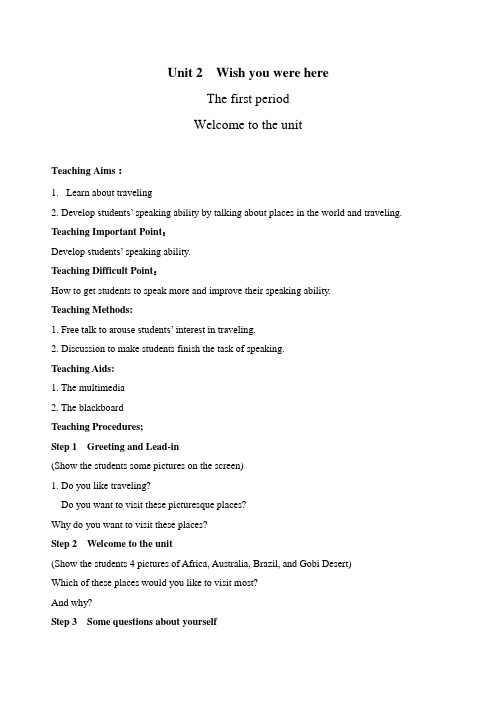
Unit 2 Wish you were hereThe first periodWelcome to the unitTeaching Aims:1.Learn about traveling2. Develop students’ speaking ability by talking about places in the world and traveling. Teaching Important Point:Develop students’ speaking ability.Teaching Difficult Point:How to get students to speak more and improve their speaking ability.Teaching Methods:1. Free talk to arouse students’ interest in traveling.2. Discussion to make students finish the task of speaking.Teaching Aids:1. The multimedia2. The blackboardTeaching Procedures;Step 1 Greeting and Lead-in(Show the students some pictures on the screen)1. Do you like traveling?Do you want to visit these picturesque places?Why do you want to visit these places?Step 2 Welcome to the unit(Show the students 4 pictures of Africa, Australia, Brazil, and Gobi Desert)Which of these places would you like to visit most?And why?Step 3 Some questions about yourself1. Have you ever been to some places?2. What is the most exciting place you have ever been to?3. Try to describe the place for us.Step 4 Pair WorkBob just come back from Sydney, and now Susan is asking him about his trip.1.Work in pairs and try to use the following expressions.Useful expressions:• What do you think of the city?• How do you find the city?• Are there any places of historic interest to see in this city?• What is the city famous for?• Would you please tell me something about the historic art of the city?• I’d like to look around the city.• How I wis h I could go there someday!2. Act out your dialogue in front of the class.Step 5 Discussion-- talk about traveling(show the following on the screen)Bob likes traveling, but Jean thinks it too costly and she has a good idea about how to travel without paying too much.Step 6 Homework1. Find more information about places in the world and traveling.2. Preview the reading text.3. Unit Revision: P75: Period 1.。
Unit 2 Welcome to the unit (课件)八年级英语上册(牛津译林版)
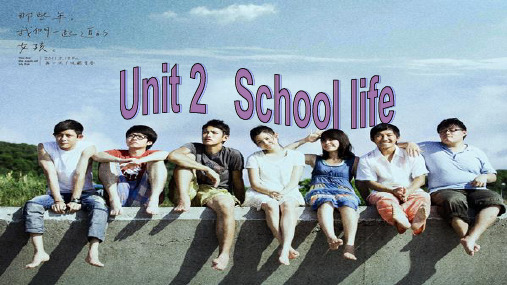
help, magazine, much, polite, teenager, good-looking, tidy, agree, popular, good
Eric: Yes. And 90% of them say good friends should be (4)_h_e_lp__fu_l_. They should be ready to help each other.
Eric: Yes. I am reading a report in this (1) m__a_g_a_z_in__e. It shows the results of a survey (调查). The topic (话题) is what kind of friend is the most (2) _p_o_p_u_l_a_r_ with young people.
cookies
football
soccer
American football
football
rubber eraser
autumn
fall
lorry
truck
holiday
vacation
shop store
British adj. 英国的 biscuit n. 饼干 lorry n. 卡车 rubber n. 橡皮 American adj. 美国的 cookie n. 饼干 truck n. 卡车
help, magazine, much, polite, teenager, good-looking, tidy, agree, popular, good
牛津英语新译林版unit2Welcome to the unit
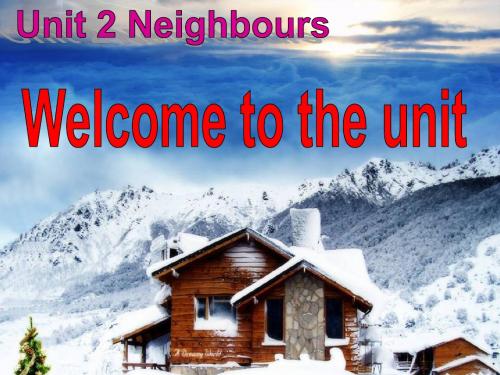
waiter, waitress, cook
Make a dialogue
A: Who is your neighbour? B:…is my neighbour A:What’s your neighbour?/ What does your neighbour do ? B:He is/she is…. A:Where does he/she work? B:He/She works in …..
Unit 2
Neighbours
They are neighbours.
/’neibə/
They live in the same neighbourhood.
/’neibəhud/
1. What can you see in the 4 pictures? 2. Can you tell me something about each picture?
Amy: What do you have _______ around your neighbourhood? Simon: We have supermarkets, __________, a school and a restaurants hospital. living there? Amy: Do you like ______ good to live in a Simon: Yes. It’s _____ neighbourhood like that.
He likes baseball. 他喜欢棒球运动。 He’s very like his father. 他很像他的父亲。 She’s wearing a dress like mine. 她穿的连衣裙和我的一样。
1. What’re the meanings of these words? waiter, doctor, teacher, nurse, student, cook
Unit 2 Welcome to the unit 教案2
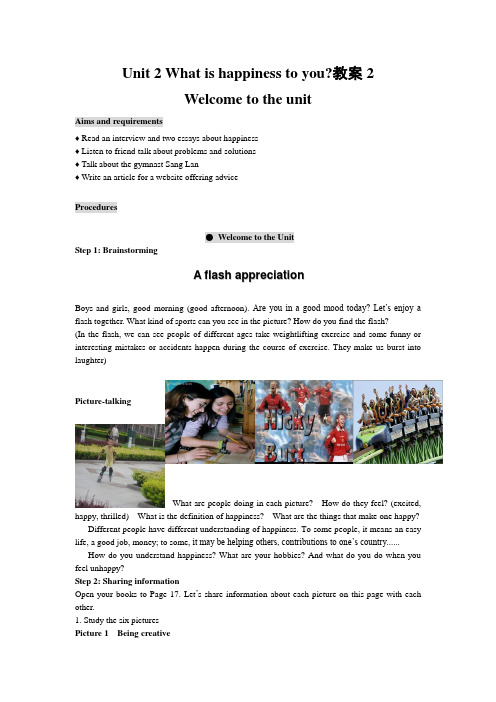
Unit 2 What is happiness to you?教案2Welcome to the unitAims and requirements♦ Read an interview and two essays about happiness♦ Listen to friend talk about problems and solutions♦ Talk about the gymnast Sang Lan♦ Write an article for a website offering adviceProcedures●Welcome to the UnitStep 1: BrainstormingA f l a s h a p p r e c i a t i o nBoys and girls, good morning (good afternoon). Are you in a good mood today? Let’s enjoy a flash together. What kind of sports can you see in the picture? How do you find the flash?(In the flash, we can see people of different ages take weightlifting exercise and some funny or interesting mistakes or accidents happen during the course of exercise. They make us burst into laughter)Picture-talkingWhat are people doing in each picture? How do they feel? (excited, happy, thrilled) What is the definition of happiness? What are the things that make one happy?Different people have different understanding of happiness. To some people, it means an easy life, a good job, money; to some, it may be helping others, contributions to one’s country......How do you understand happiness? What are your hobbies? And what do you do when you feel unhappy?Step 2: Sharing informationOpen your books to Page 17. Let’s share information about each picture on this page with each other.1. Study the six picturesPicture 1 Being creativeDo you like drawing? When and how did you begin to develop this interest?What does this hobby bring to you? (Whenever I feel upset and want to escape from everything, I like to go into my bedroom and take up my paints and brushes. It's so wonderful--all my thoughts and ideas can be expressed in my pictures.)What other things mean 'being creative' to you? (Thinking of different solutions to solve problems, expressing myself in my own ways and making new things.)Picture 2 Doing exciting thingsWhat are exciting things to you? (like white-water surfing or bungee jumping.) Why do people like exciting things? They bring lots of fun and help people forget all the troubles and worries. Picture 3 ReadingDo you like reading? Does reading make one happy? Why? It is really enjoyable when reading especially in a peaceful and quiet environment. Sometimes we are so absorbed by the characters in the book and their stories that we forget all about the outside world. Through reading, we gain knowledge and our horizons are broadened.Picture 4 Playing sportWhich are your favorable sports? It's a really good way to make friends, keep fit and relax. Picture 5 Spending time with familyDo you enjoy spending time with your family? When you feel happy or unhappy, do you talk to them about your problems and achievements? Family is important to everyone. It's a perfect time to talk to your family about your problems. They can give you good advice and make you confident. They are also happy for the achievements you made.Picture 6 Learning new thingsHave you ever been to a natural history museum? Why do people like museum? In a museum, we can find out more information than we can just through reading books. Visiting these kinds of places can give us a real insight into history.What other ways do you think may help you learn more new things? (Surfing the Internet and talking to different people.)2. Talk about each picture and exchange opinions with your partner.Which things do you often do and like to do? Why do you feel happy when doing these? Step 3: DiscussionWork in groups of 4 to discuss the three questions and then report the answers to the whole class.1. What are things that make everyone happy?There are some things in life that make us feel happy. For example, as a small child, something as simple as getting some sweets is enough to make him or her into a happy child. As a student, passing an exam can make him or her feel on top of the world. For an adult, getting a great new job or traveling to different parts of the world are some of the happiest times.2. What are the things which make you happy?Eating a hearty meal, getting some new clothes, having enough money for something I really want, reading a great book, watching a really good film, making a new friend or making up with my friends after an argument.3. If you had a friend who was unhappy, how would you try to help him or her?In this case, I will try to be a good listener and understand what has made him or her so upset. Offer some advice if necessary. Invite him to go outside for a walk or go shopping together to cheer him upStep 4: HomeworkRead the two articles on P112-113. Prepare the reading part.。
牛津译林版英语必修2讲义:Unit 2 Section Ⅱ Welcome to the unit

Section ⅡWelcome to the unit &Reading-Language pointsarrange vt.&vi. 安排;排列(教材P22)I've been quite busy arranging my holiday with my older brother,Colin.我最近一直忙着安排我和我哥哥科林的假期。
(1)arrange for为……安排,准备arrange(for sb.)to do sth. 安排(某人)做某事arrange+that 从句安排……(2)arrangement n. 安排,筹划,准备①I arranged that we should meet at eight o'clock.我安排好了我们八点见面。
②I've arranged for a window cleaner to come on Thursday.我已经安排一个窗户清洁工星期四来。
③(朗文辞典)Have you made all your travel arrangements (arrange)?你的旅行都安排好了吗?[名师点津]表示“安排某人做某事”用arrange for sb.to do sth.,而不用arrange sb.to do sth.。
[语境助记]China government has made arrangement for keeping stable in food and drugsafety,but some people haven't arranged for it.中国政府已经为维持食品药品安全形势的稳定做好准备,但还有一些人未做好准备。
desert n.沙漠vt.抛弃,舍弃(教材P22)We're going to ride camels through the Sahara Desert.我们将要骑着骆驼穿越撒哈拉沙漠。
Unit 2 Welcome to the unit
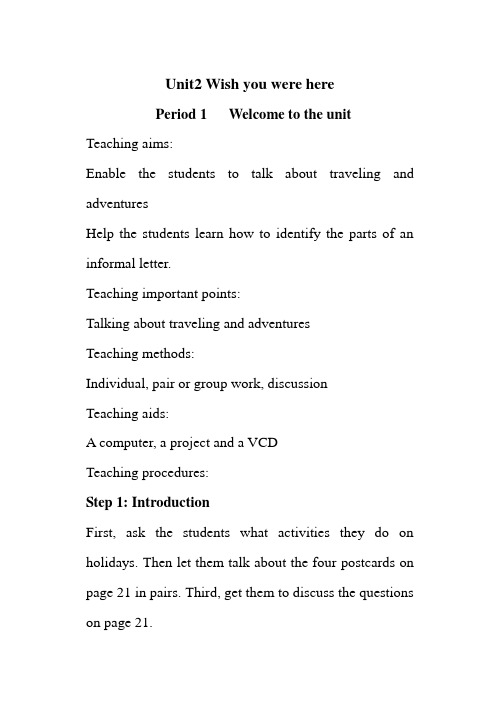
Unit2 Wish you were herePeriod 1 Welcome to the unit Teaching aims:Enable the students to talk about traveling and adventuresHelp the students learn how to identify the parts of an informal letter.Teaching important points:Talking about traveling and adventuresTeaching methods:Individual, pair or group work, discussionTeaching aids:A computer, a project and a VCDTeaching procedures:Step 1: IntroductionFirst, ask the students what activities they do on holidays. Then let them talk about the four postcards on page 21 in pairs. Third, get them to discuss the questions on page 21.T: Now, I’d like to ask you some questions about activities you do on holidays. Please look at the questions on the screen.Show the following on the screen.1.How do you spend your holidays?2.What do you usually do on your holidays?3.Is there anywhere you would particularly like to visiton holidays? Where and why?Ask the students to answer the first two questions. (…) Well done! As we know, most of people spend their holidays by traveling. I guess one of the reasons is people always want something new in their life and are tired of their routine. After the busy study or work, they need to relax and make themselves refreshed. Is there anywhere you would particularly like to visit on holidays? (….)Step 2: DiscussionSounds interesting. Now, please open your book to page 21 and look at the four postcards. Please discuss themaccording to the questions on the screen with your partners. A few minutes later, I’ll ask some of you to answer them for the class.Show the following on the screen.1.What do you think of them?2.What places are they?3.Have you ever been there? If not, which of theseplaces would you like to visit most? (….)You have done a good job. Then can you think of any other exciting places to visit? What are they?Step 3: Summary and homework1. Ask the students to think about the following questions:From our own experience, when we go on a tour with a travel agency, what kind of things do we take?Suppose you want to plan a holiday with your friends, what kinds of things will you plan to take? What about planning an adventure holiday?2. Ask students to read Part A and summarize the itemsColin wants to take on his holiday and why.3. Have a brief discussion on the topic:Do you think Colin has made good preparations for his travels?If you were his best friend, what suggestions would you give him?Step II Vocabulary Learning1.Ask the students to think of all the items Colin haspacked for his holiday.2.Ask them to compare their answer with the itemslisted in Part B3.Ask the students to explain the reasons why theseitems are necessary for an adventure trip.4.Finish the letter in Part C.Step III Vocabulary Extension1.Ask students to discuss the following questions:Is Colin really well-equipped for the journey?Is he missing something very important?2.Ask them to read the instructions for Part D and try tocomplete the items either individually or in pairs. 3.Ask students to make a list of the items which theythink are usually taken on adventure holidays.Step IV Summary and HomeworkRemember the words and expressions about adventure;Finish the exercises on the workbook.。
Unit 2 Welcome to the unit
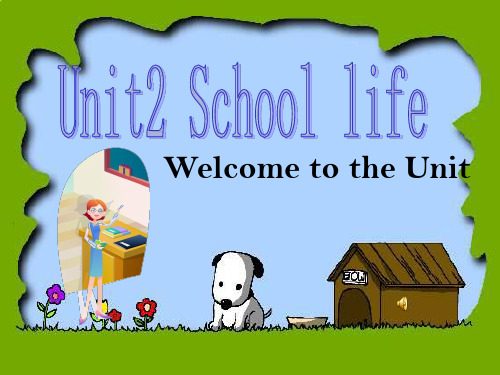
Complete the dialogue.
Hobo: Why ___d_o_n__’t__ dogs go to school,
Eddie?
Eddie: Because we’re __c_l_e_v_e_r_e_r__ than
people.
Hobo: What is school ____l_i_k_e_______? Eddie: It’s like __w__a_t_c_h_i_n_g__T__V_________,
but there are
_f_e_w__e_r_advertisements.
Make a survey
What do you think of your school? What’s your favorite subject? Do you like outdoor activities? Do you like fewer lessons? Do you like the lessons on the Internet?
I am a boy from England. I am a Grade 8 student. I like playing sfooctcbearll. And I am good at maths . FAaultlumn is coming. So my best friend ,Max’s birthday is coming too. He lives on the gfirrosut nfdlofoloror. I will give him a nice rubber. eI rpalsaenrto watch a film wmithovhiiem on that day.
Presentation
牛津译林版(2019)必修 第二册 Unit2 Welcome to the unit 教案
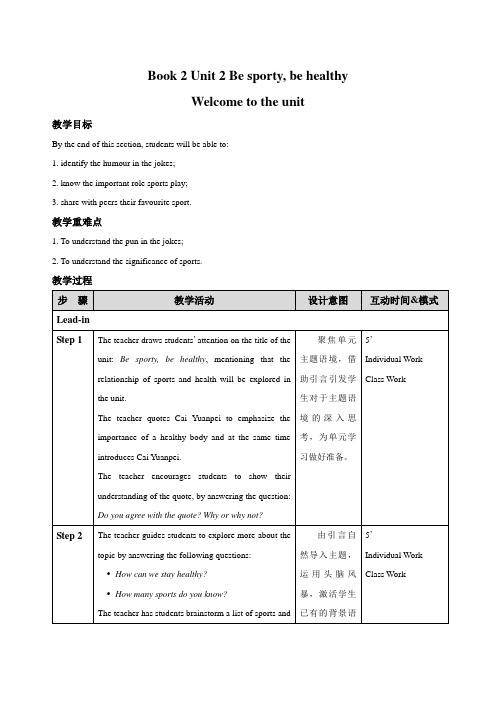
How many sports do you know?
The teacher has students brainstorm a list of sports andthen groupsthem into3 big categories:ball games,trackand fieldandwater sports.
Book 2 Unit 2Besporty, be healthy
Welcome to the unit
教学目标
By the end of this section, students will be able to:
1.identify the humour in the jokes;
2. know the important role sports play;
A: They stand close to thefans.
Cool:
(1)Used to show that you admire or approve of something because it is fashionable, attractive and often different.
Ball:
(1)A round object used for throwing, hitting or kicking in games and sports.
(2)A large formal p来自rty with dance.
Joke5
Q: How do basketball players staycoolduring the game?
Sample answer:
They trick the reader by cleverly playing with words that have more than one meaning.
Unit-2--Welcome-to-the-unit-牛津英语
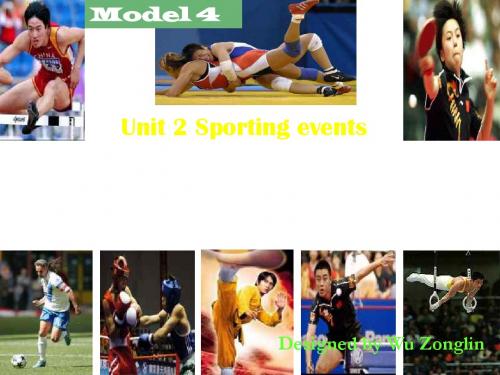
2. Do you like watching it? 3. In your opinion, do you think these sports are too violent?
Some people view them as archaic and an unnecessary display of violence while its supporters emphasize their self-expression and health benefits. They look violent, in fact they are good ways to keep fit.
1)table tennis or ping pong
It is convenient for people to play and does not require too much equipment. People have to be quick-minded and have rapid responses. It is a good way to make friends and meet new people
Homework:
1. Find more information about the business of sport. 2.Preview reading text.
游艇俱乐部 深圳游艇出租 游艇码头 豪华游艇
游艇出租价格 七星湾游艇会 南澳游艇
They will usually be taken away from the ring and killed after the fight.
5. Why is bullfighting a dangerous sport?
- 1、下载文档前请自行甄别文档内容的完整性,平台不提供额外的编辑、内容补充、找答案等附加服务。
- 2、"仅部分预览"的文档,不可在线预览部分如存在完整性等问题,可反馈申请退款(可完整预览的文档不适用该条件!)。
- 3、如文档侵犯您的权益,请联系客服反馈,我们会尽快为您处理(人工客服工作时间:9:00-18:30)。
Unit 2 Growing pains
Period one Welcome to the Unit
The general idea of this period:
Four pictures are designed to point out the theme of this unit, growing pains. The questions for discussion can improve students’ speaking ability and can arouse stud ents’ interests for speaking and discussing.
Teaching aims:
1.Let the students get familiar with the topic of growing pains. As the topic is
quite common to them.
2.Encourage them to practice their spoken English by talking about their own
experience or combining what they have seen and heard in the daily life. Teaching important and difficult points:
1. Activate students’ imagination.
2.Relate the information given in the book to the students’ own experience and let
them express their opinions fully and freely.
Teaching methods:
1.Individual work or group work to make every student speak English and think in
English.
2.Teacher-students exchanging methods by interviewing
Teaching procedures:
Step One: Warming up
1.A report to the class by a student about the difficulties in high school
2.What are Growing pains?
Teacher may use the following questions to activate student’s interest in the problems between parents and teenagers.
3.Do you have growing pains.Show some pictures:
Pains of exams,pains of
Questions:
Do you love your parents?
Do you sometimes quarrel with your parents?
Why do you quarrel with them?
Students: I love my parents, but sometimes I don’t want to stay with them because they don’t understand me. They force me to do things I don’t like or I’m n ot interested in. So if we stay with them, we sometimes have a quarrel with them…
Teacher: So it seems there are many different problems between two generations. Maybe most of you have some trouble in communicating with your parents.
Could you tell me what kind of problem you have with your parents?
Encourage the ss to talk freely by using the following useful words or phrases. misunderstanding… distrust problems interference force to you to do something…
T: It’s true that some teenagers and their parents can’t understand each other sometimes. Many teenagers experience growing pains when growing up and couldn’t find a way to solve it.
Step Two: Presentation
1. Picture talking and describing
Guide the ss to read the instruction and the pictures on the book.
Ask the Ss whether they are familiar with the situation in the pictures and make them describe the pictures with their own words.
Teacher can give example first.
Qs:what’s happening in the picture?
If you were the kids in the picture,how would you feel ?
2.Summary of the topics
Encourage ss to use their imagination and any descriptions are acceptable. Step Three: Free talk
Ask ss to focus on the questions and think about the answer individually first. Let them tell the true feeling. As for the last question, teacher may ask the ss how they think about the experience now. After talking about the questions, guide the ss to think about the problem of generation gap and discuss how to overcome the problems.
After leaving home, how do you think of the relationship between you? How to
deal with the problem?
When you have a problem with them and want to talk to someone, who do you choose to talk to?
Let the ss conduct a feedback activity.
Step Four: Discussion
1.If parents and children want to get on well with each other,what should they do ?
2.Good parents in my eyes
Have students work in their groups and use some adjectives to describe the good parents in their eyes.
Step Five: Summary
Make a conclusion: Growing pains can be very painful if we do nothing to understand others and make others understand us. Try to let your parents know how you feel and care your parents’ feeling, too. In this class we have talked about the difficulty in growing up. We have a warm discussion about the pictures and the problems happening to children and their parents. From this class we know out parents’ love is rue and selfless. Now I give you your homework—write a few words to your parents from you deep heart, which can express your love to your parents.
Step Five: Homework
1.Preview the reading part.
2 Write a letter to your parents from your deep heart.。
